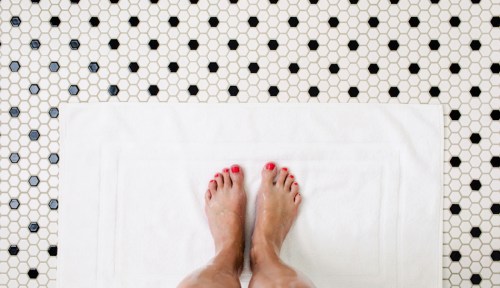Yes, You Have To Actively Wash Your Feet in the Shower To Keep Them Clean, According to a Podiatrist
If you're curious about whether you need to wash your feet in the shower, we've got the answer straight from a podiatrist.

The logic makes sense: When the water and soap travel the path down to your feet, that’s the equivalent of cleaning them, right? Not quite. “The feet are a commonly missed body part because they are so far out of our general radar when bathing,” says Lauren Wurster, DPM, FACFAS, a podiatrist at EverNorth Care Group in Glendale, Arizona. So, it is important to take that extra step to wash your feet in the shower.
Experts in This Article
If you want your feet to be squeaky clean, Dr. Wurster says, “Foot baths with Epsom salts are a great way to do this, if you have time.” You can make a simple foot bath by adding a half cup of Epsom salt to a gallon of lukewarm water. Soak your feet for about 15 minutes and dry your feet thoroughly.
Not everyone has that kind of time, so if the self-care you’re fitting into your busy schedule involves simply taking enough time to bathe each week, Dr. Wurster says using a washcloth or loofah to clean between your toes works, too. “Generally the same soap that you use for the rest of your body will work just as well for your feet,” she explains.
Make sure to wash the tops, bottom, and heels of your feet as well as between your toes. Other than your hands, a clean washcloth is the best cleansing method to wash your feet in the shower because loofahs could potentially harbor bacteria over time.
One other tip to keep bacteria and fungus at bay? “Make sure you are drying between your toes by either using a towel afterward or spreading your toes out on an absorbent towel or bath mat,” Dr. Wurster recommends.
Best practices to keep your feet clean and healthy
Before you wash your feet in the shower, Dr. Wurster says to make sure everything you’re using is clean, too. She recommends bleaching or cleaning your shower at least once a week. “All of the germs from the rest of your body go on the ground, so you want to make sure you give your feet the cleanest surface to step on,” says Dr. Wurster.
Why bleach, specifically? According to the World Health Organization, bleach is a disinfectant that can kill fungal spores—and not all cleaners can do that, so read labels carefully.
Some other foot care tips Dr. Wurster recommends include:
- 1.Refrain from going barefoot in public places, such as pools, showers, and locker rooms to prevent athlete’s foot and toenail fungus.
- 2.Take off your toenail polish at least every two weeks and let your nails be polish-free for at least a few days.
- 3.Trim your toenails straight across and at the level of your skin. Cutting them in a rounded or too-short fashion increases the risks of painful ingrown toenails and infections.
- 4.Go to a nail salon that uses freshly opened sterile packs of instruments (and using different ones for your hands and feet), and use a liner in the tub basin.
- 5.Apply a moisturizing cream to the tops, bottoms, and heels of your feet (but not between the toes) daily if you frequently walk barefoot or in sandals to prevent calluses and other rough foot areas.
You’re more likely to experience a foot infection from shower floors or other surfaces if you experience cracked, dry skin on your feet. That’s why keeping your feet moisturized can be a hygienic benefit.
What if my partner has foot fungus?
We know–this is an itch-inducing topic. But it’s fair to ask what you should do if your partner brings home an unwanted visitor on their feet like warts, athlete’s foot, or toenail fungus.
Just like you can get these unwanted foot problems from public showers, you can get them from your private shower from a loved one, according to the Journal of Fungi. It might feel weird to wear shower sandals in your own home (though, that is a possible solution), but the best method is to make sure you clean surfaces thoroughly before showering. This means using bleach to clean the shower and bathroom floors and using a fresh towel to step on after your shower.
While your loved one is treating their foot woes, make sure they wear sandals in all areas of your home and air out their shoes between the times they wear them. You can also utilize spray disinfectants on their shoes to keep them clean.
“If you have any foot concerns, see a podiatrist (a foot and ankle specialist), sooner, rather than later,” Dr. Wurster recommends. “It is much easier and better for you to take care of a small problem than a chronic one.”
Sign Up for Our Daily Newsletter
Get all the latest in wellness, trends, food, fitness, beauty, and more delivered right to your inbox.
Got it, you've been added to our email list.










